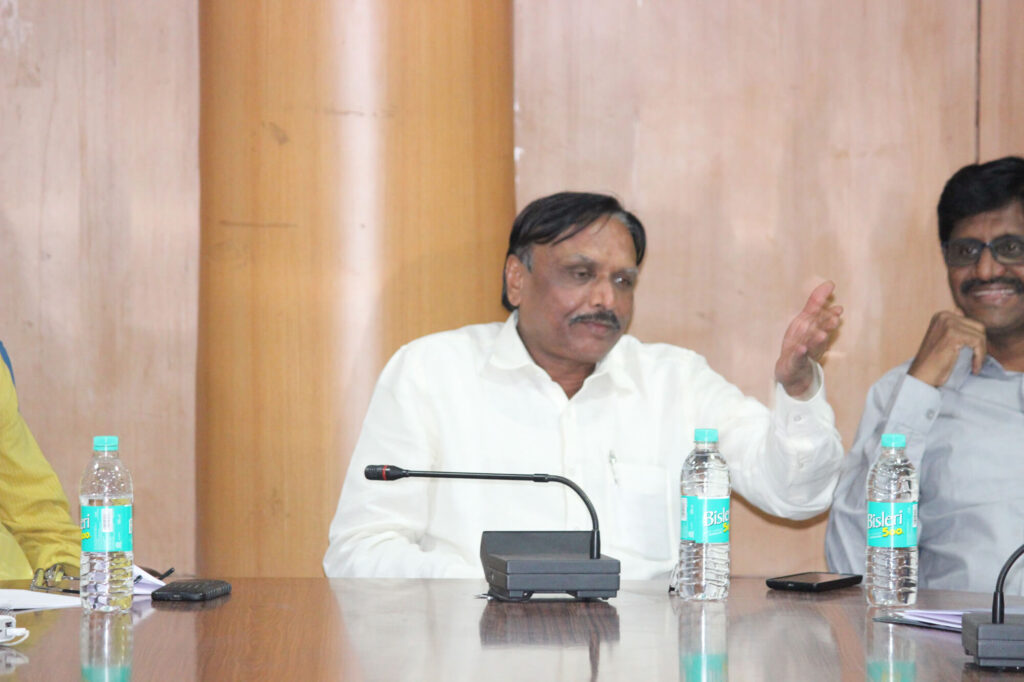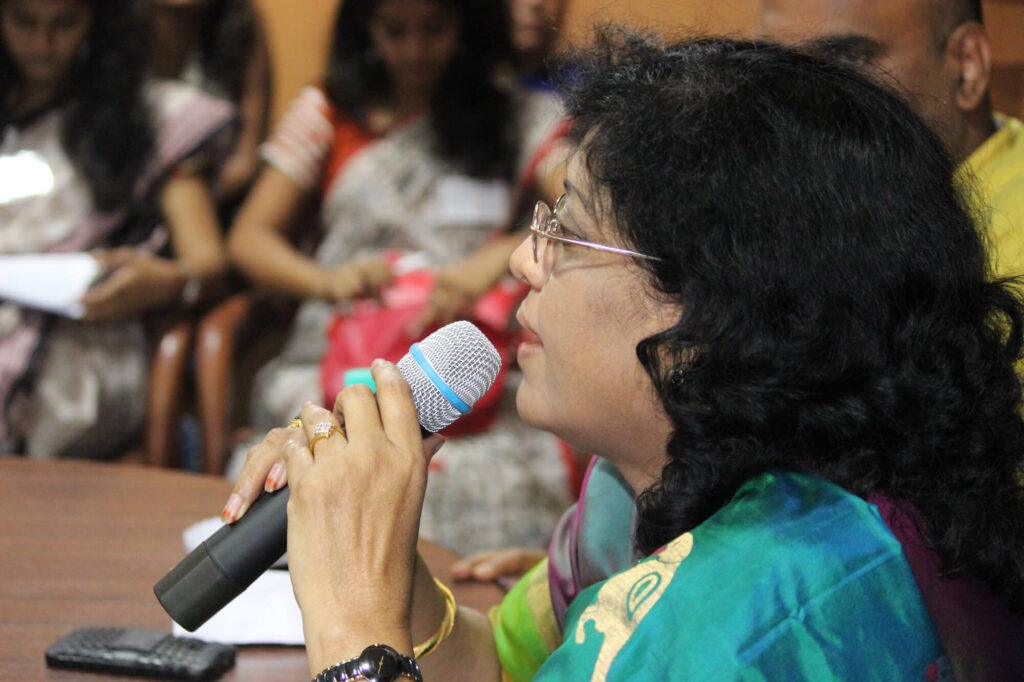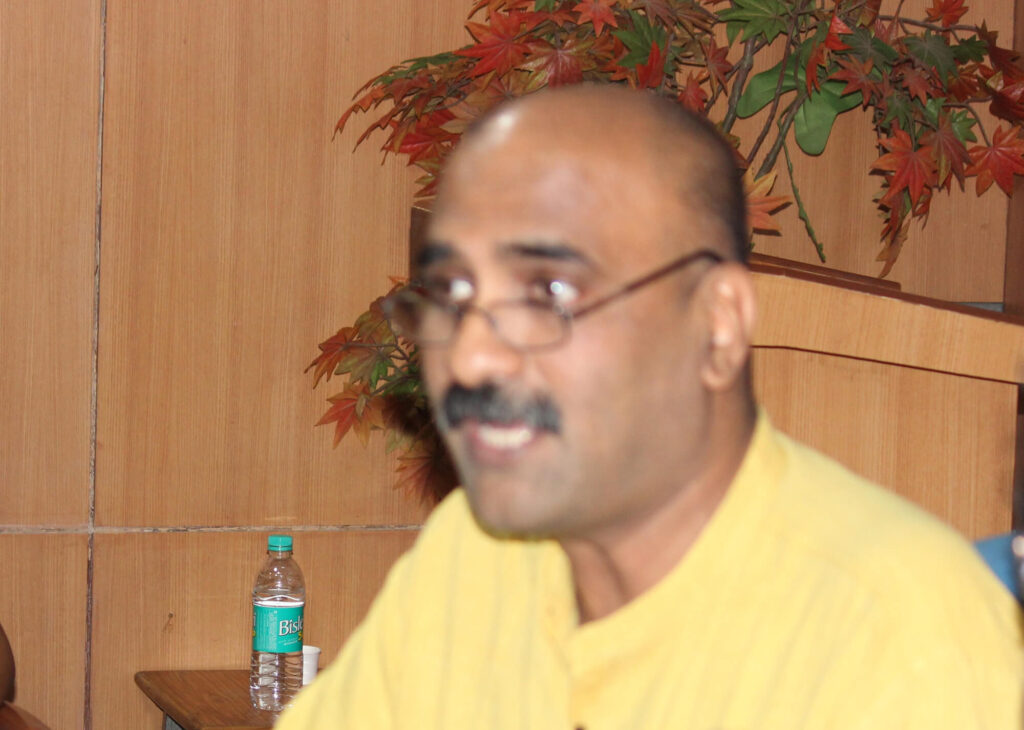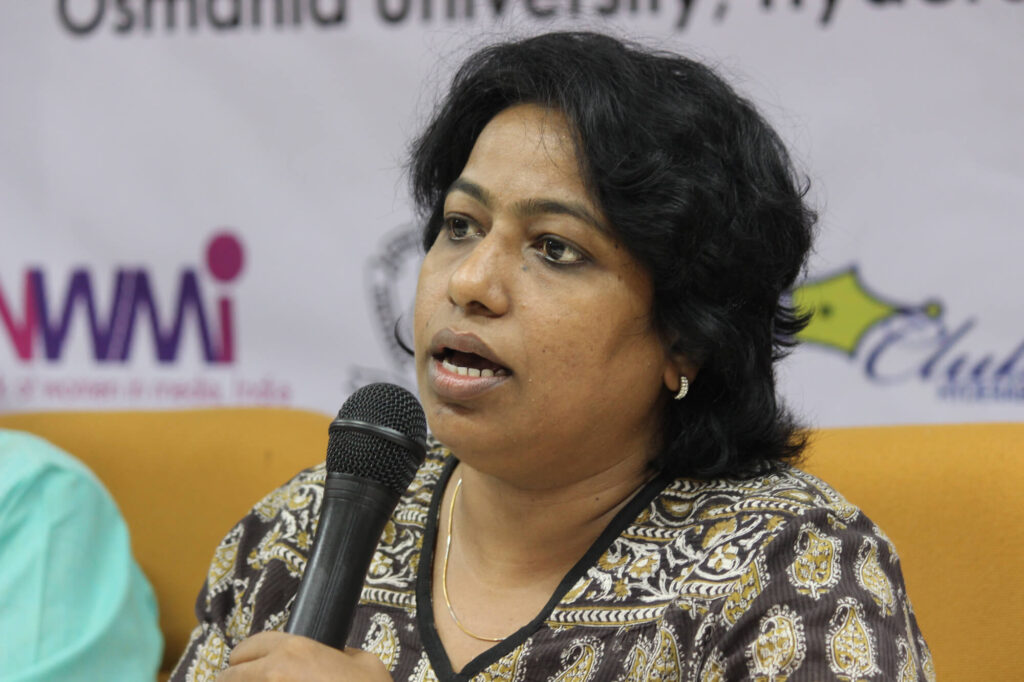SATURDAY, 12 November 2016, 2.30 – 4 pm
Working Session 4: Understanding the Labyrinths of Law
On Saturday afternoon, the meeting venue shifted to the Conference Hall in the campus of the Potti Sreeramulu Telugu University in Hyderabad. Opening the session, Prof SV Satyanarayana, Vice Chancellor of the University, and Sathi Reddy, Registrar and Professor of Journalism, welcomed the participants and provided a brief introduction to the history of the 30-year-old University, which had reservation for women from its inception in order to boost the presence of women in higher education.

Session Chair C Vanaja explained the purpose of the session: familiarising participants with the workings of the law on the ground.
Tripurana Venkatratnam, Chair of the Women’s Commission of Telangana State, shared her observations about the implementation of laws relating to women’s rights. According to her, despite the existence of Section 498A of the Indian Penal Code, aimed at punishing cruelty towards women in a marital relationship, the male-mindset that prevailed within the police force and judiciary hampered women’s quest for justice. Thanks to additional allegations tagged on by the police and advocates, which cannot be proven in court, the cases are often dismissed. She said the majority of the cases brought before the Commission related to violence against women, but little could be done because of problems in the way they were handled by the police and in the courts. The recent Criminal Law Amendment of 2013, which broadened the definition of sexual assault and enhanced punishment for perpetrators, was also not being implemented, she said. Indefinite adjournments meant that cases dragged on for years.

Ms Venkatratnam also spoke about the phenomenon of ‘NRI marriages’ in which men enter into marriage, take large dowries, and then leave the country. The abandoned women are left endlessly waiting to be called to join their husbands abroad, usually in the US or the Gulf countries. Such cases are shackled with jurisdictional issues, which further worsen the women’s plight. The Commission has been pressurising the Government of India to sign bilateral agreements with the countries where most of these men reside so that the cases can be effectively prosecuted.
She believes that in order to address the male biases among judges it is necessary to mandate 33 percent reservation for women in the judiciary. She also flagged the use of technologies such as mobile phones to record and then circulate videos of rape, saying that such instances were increasingly coming to her notice. Ms Venkatratnam urged the media to investigate and pursue justice for the women and young girls subjected to this form of harassment. Women journalists should act as a pressure group, she said.
Manoj Mitta, senior editor with the Times of India, spoke about legal issues that have an impact on the news media and journalism. Citing the example of the contempt of court notice recently issued to a former judge of the Supreme Court, Markandey Katju, he pointed out that if a former justice was vulnerable to action for critiquing a judgement on his own blog, it was only too clear how the provision could be used against journalists. According to him, such an over-reaction by the apex court could prove dangerous for journalists reporting on sub judice cases. Even though the Law Commission of India has recommended that truth is permissible as a defence, there has been only limited reform in this area. This is ironic in a country that swears by the motto, ‘Satyameva Jayate’ (truth will triumph), he pointed out.

Asked how he has escaped inviting contempt of court charges in the many years he has been reporting on legal matters, he said, “I have managed to strategically convey that I have done my homework rigorously, leaving no room for doubt.” According to him, criminal defamation should be done away with, leaving civil contempt intact as a remedy for aggrieved parties. Across the world a private wrong (civil) tends not to be seen as a public wrong (criminal); in most democracies defamation is dealt with as a civil offence. However, India has yet to follow this path.
Touching upon other laws of particular relevance to journalists, Manoj commented on the sedition law, pointing out that the huge amount of discretion provided to the police left the law open to misuse or overuse. The right to privacy of victims of sexual assault was another sensitive issue which many journalists did not pay heed to. Likewise, he said, the contentious issue of stings and the potential violation of privacy through them had to be seen in the context of the larger, identifiable public interest.
In the discussion that followed, network members Neha Dixit and Shahina KK talked about how laws had been used against them – for ‘inciting communal hatred’ or ‘intimidating witnesses’. According to the latter she had even been defamed, described by sections of the media and also on social media as an agent of the Lashkar-e-Toiba, but was left with no recourse to justice.

The discussion then moved to the issue of self-regulation in the media (or the lack thereof) and the ineffective nature of a statutory body like the Press Council of India. There was scepticism about the media industry’s interest in an independent self-regulatory body. Its scant respect for the law was evident from the fact that very few media houses have set up complaints mechanisms under the new law to deal with sexual harassment in the workplace. A notable exception, said Divya Arya, was the BBC, including BBC India, which has a well functioning Internal Complaints Committee. She also asked what could be done to combat the notion that women file false cases to get men into trouble. Responding to Manoj’s assertion that media houses should immediately report all internal cases of sexual harassment to the police, Laxmi Murthy said that the purpose of the law was civil redress, to make the workplace more conducive to women, and that not all women subjected to harassment wanted to pursue criminal cases.
In response to Jyoti Punwani’s comment that the Supreme Court was often the last resort for justice, participants also discussed the judiciary and the fact that “justice is too important to be left only to judges”. According to Manoj, the judiciary needs to be made more diverse in terms of gender, caste and ethnicity, not necessarily because women are more progressive but because diversity is always good. In conclusion, Manoj suggested that journalists must keep to their dharma of truth telling, despite the fact that the authorities might react badly to this.


